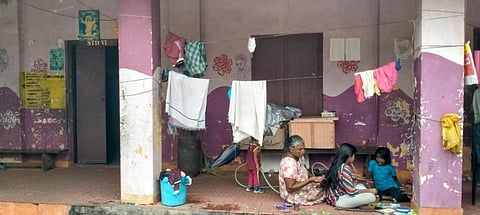

The Kerala government’s decision to reopen schools from November 1, 2021 has been well-received in most parts of the state, but not in Valiyathura, a fishing village on the outskirts of the capital Thiruvananthapuram.
The novel coronavirus disease (COVID-19) pandemic came as a blessing in disguise for the local fisherfolk who lost their homes, land and livelihoods to large-scale coastal erosion and have been living in a government school building since 2018.
The state’s Valiyathura, Beemapalli, Vizhinjam, Azhimala and Pulluvila coasts continue to suffer from erosion due to rising sea-levels and commercial constructions.
Silva Marry, 78, along with her daughter, son-in-law and two grandchildren, had found shelter in one of the classrooms after Cyclone Okhi ravaged her entire neighbourhood. The school was officially converted into a rehabilitation centre in September 2018. Now, Marry and 16 other families who live there fear they will be driven out without any alternative shelter once the schools reopen.
T Johnny, a local fisher whose home was washed away by the rising sea, said:
There were many attempts in the past to close down the rehabilitation camp on grounds of resuming classes, without providing us an alternative. The latest move was in January 2020, a month before the pandemic struck India. With schools shuttered during lockdowns, the situation became a blessing in disguise for us.
Over a 100 fisher families, who lost their land and houses during Cyclone Okhi and heavy sea erosion over the last four years in Valiyathura, live either in camps or rented dwellings elsewhere, according to government estimates.
Safe homes on the coast
The government has offered them a compensation of Rs 10 lakh per family — Rs 6 lakh for buying of land and Rs 4 lakh for construction of the house — to find their own alternatives. The displaced villagers want the government to construct safe housing for them in the locality and termed the compensation insufficient.
“I will not even be able to buy three cents (0.03 acres) of land with the money at the prevailing prices in Thiruvananthapuram,” said Silva Marry. The government has also insisted the house be concrete.
Twenty more ‘climate refugee’ families live in the adjacent, abandoned godown of the Kerala State Fisheries Department. The godown lacks proper ventilation and rooms, but at least these families don’t fear eviction once schools reopen, Marry added.
The inhabitants of the school, who survive entirely on the free ration provided by the state, are also unwilling to relocate to inland government flats. Fishworkers by tradition, they fear moving away from the shores will alienate them from their livelihood, culture and lifestyle.
They demanded small but safe houses in the same coastal region where they have lived for generations. “I want to live and die in my own home,” said Marry.
Man-made crisis
Several anthropogenic factors — and not only climate change — have also contributed to Thiruvananthapuram’s severe shoreline erosion since 2017. Local fisherfolk and experts blame the Rs 7,525-crore massive seaport built in a public-private partnership between the Kerala government and the Adani Vizhinjam Pvt. Ltd on the adjacent Vizhinjam coast.
The entire beach span in Valiyathura and neighbouring Shanghumukham remains inundated in seawater.
KV Thomas, former scientist of the National Centre for Earth Science Studies, said:
The coastal erosion in the Vizhinjam-Valiyathura-Shanghumukham region is the aftereffect of the ongoing large-scale construction work at the seaport site, especially for a 3000-metre breakwater. Sea erosion will worsen in the coming years. It will pose challenges to the local airport and many Indian Space Research Organisation facilities in coastal villages Veli and Thumba.
The planning for port construction has not taken into consideration properly its impact on the environment and livelihoods, he added.
More members of the fishing community will be displaced in the coming years because of the project along the erosion-prone coast.
Dangerous living
At the camp, the displaced villagers kept repeating the long story of negligence by the authorities and said they have lost faith in the promises made by officials.
All residents have lost their jobs and livelihoods because low access to the sea has diminished the opportunity of fishing. Only a handful of them get welfare pensions.
The school initially lacked electricity and it took the inhabitants a lot of effort to get the connection.
They live in unhealthy conditions and are threatened by Zika and other mosquito-borne diseases, said Johnny. “Snakes often sneak into the school.”
At least two families, including children, differently-abled and elderly, live in each of the six classrooms. Some members also suffer from chronic diseases.
Women don’t have privacy even when they need to change clothes. Students at the camp have very little means to attend online classes and most were enrolled in the school that has turned into their home for the last three years.
George Jussa, the father of a 31-year-old differently-abled inhabitant, has to pay enormous taxes for the special two-wheeler gifted by the government to his son. "The government should give us decent houses with the condition that they cannot be resold,'' he said.
The camp members say there were no inspections or visits by authorities to the school since the pandemic.